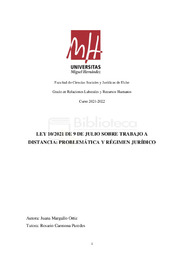Please use this identifier to cite or link to this item:
https://hdl.handle.net/11000/26600Full metadata record
| DC Field | Value | Language |
|---|---|---|
| dc.contributor.advisor | Carmona Paredes, Rosario | - |
| dc.contributor.author | Margallo Ortiz, Juana | - |
| dc.contributor.other | Departamentos de la UMH::Ciencias Sociales y Humanas | es_ES |
| dc.date.accessioned | 2022-04-12T09:37:11Z | - |
| dc.date.available | 2022-04-12T09:37:11Z | - |
| dc.date.created | 2022-01 | - |
| dc.identifier.uri | http://hdl.handle.net/11000/26600 | - |
| dc.description.abstract | La ley de trabajo a distancia nace de la necesidad de regular un modelo de prestación laboral, hasta antes poco regularizado, y que, tras las medidas de contención y las restricciones debido al COVID-19, cada vez mas empresas mantienen la posibilidad de que sus trabajadores puedan acogerse a esta modalidad de trabajo. En el presente estudio se analizará el régimen jurídico de los puntos que hemos considerado de mayor relevancia de la nueva norma que se consolidó como Ley el pasado mes de julio. Finalmente, se resalta la necesidad real de una norma que regule unos mínimos en común, aunque en cada apartado pueda llevarse a la negociación colectiva, algo necesario, ya que quienes negocian, son los verdaderos conocedores del sector al que pertenecen y sus necesidades. | es_ES |
| dc.description.abstract | The distance work law was born from the need to regulate a model of labor provision, until previously little regularized, and that, after containment measures and restrictions due to COVID-19, more and more companies maintain the possibility that their workers can benefit from this type of work. In this study, the legal regime of the points that we have considered most relevant of the new norm that was consolidated as Law last July will be analyzed. Finally, the real need for a standard that regulates common minimums is highlighted, although in each section it can be taken to collective bargaining, something necessary, since those who negotiate are the true connoisseurs of the sector to which they belong and their needs. | es_ES |
| dc.format | application/pdf | es_ES |
| dc.format.extent | 50 | es_ES |
| dc.language.iso | spa | es_ES |
| dc.publisher | Universidad Miguel Hernández de Elche | es_ES |
| dc.rights | info:eu-repo/semantics/openAccess | es_ES |
| dc.rights | Attribution-NonCommercial-NoDerivatives 4.0 Internacional | * |
| dc.rights.uri | http://creativecommons.org/licenses/by-nc-nd/4.0/ | * |
| dc.subject | teletrabajo | es_ES |
| dc.subject | trabajo a distancia | es_ES |
| dc.subject | Covid-19 | es_ES |
| dc.subject | acuerdo trabajo a distancia | es_ES |
| dc.subject | teleworking | es_ES |
| dc.subject | distance working | es_ES |
| dc.subject | distance working agreement | es_ES |
| dc.subject.other | CDU::3 - Ciencias sociales::33 - Economía::331 - Trabajo. Relaciones laborales. Ocupación. Organización del trabajo | es_ES |
| dc.title | Ley 10/2021 de 9 de julio sobre Trabajo a distancia: Problemática y régimen jurídico | es_ES |
| dc.type | info:eu-repo/semantics/bachelorThesis | es_ES |

View/Open:
TFG-Margallo Ortiz, Juana.pdf
2,45 MB
Adobe PDF
Share:
.png)
